China History
“Never Forget July 7, 1937”: The 86th Anniversary of the Marco Polo Bridge Incident Remembered on Weibo
“Even without social media, I would still remember this day. It has already been etched into the collective memory of the people.”
Published
1 year agoon

On significant historical occasions such as the July 7th Marco Polo Bridge Incident, Chinese state media accounts proactively share patriotic and nationalistic content, emphasizing the importance of remembering the history of the Second Sino-Japanese War and China’s ‘century of humiliation,’ showing how Chinese social media platforms have become ‘patriotic education bases.’
On July 7th, 1937, an incident between Japanese forces and Chinese soldiers at Lugou Qiao, the Marco Polo Bridge in Beijing, led to the start of the Second Sino-Japanese War (1937-1945), known in China as the Chinese War of Resistance Against Japan (中国抗日战争).
In China’s social media era, the anniversary of the Marco Polo Bridge has become an annual moment in which Chinese state media call on netizens to collectively remember July 7, spreading images and hashtags related to the incident.
An Important Bridge: What Happened on July 7?
While July 7, 1937, is commonly recognized as the start of the large-scale war between China and Japan, some historians consider the ‘Manchurian Incident’ of September 18, 1931, as the true beginning of the Second Sino-Japanese War. This incident marked the establishment of the puppet government of Manzhouguo (Manchukuo) by Japan and its subsequent efforts to expand its influence in North China.
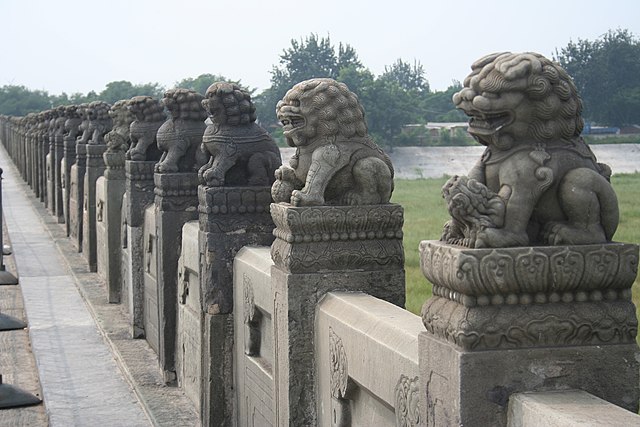
Lugouqiao (Marco Polo Bridge), image via Wikimedia Commons (source).
The Lugou (Reed Gulch) Bridge, also known as the Marco Polo Bridge, is a renowned historical river crossing located on the Yongding River. It was constructed between 1189 and 1192 during the Jin Dynasty and holds strategic significance south of the capital. The bridge is included among the ‘Eight Great Sights’ of Beijing due “the reflection of the moon at dawn on the Lugou Bridge,” as described in a poem written by Emperor Qianlong on the enchanting sight of the moon there. After Marco Polo praised the bridge in 1280 as “perhaps unequalled by any other in the world,” it gained fame in the West as the ‘Marco Polo Bridge’ (Knapp 2008, 46).
The Marco Polo Bridge Incident refers to the clash that happened on the night of July 7th, when a Japanese soldier stationed near the Marco Polo Bridge became separated from his unit. The Japanese troops assumed he had been captivated by Chinese and claimed to have heard shots, after which they demanded access to the nearby Wanping city, but were refused entrance. Although the ‘missing soldier’ later found his way back, the Japanese attacked the Chinese position (Lu 2019, 11; Schoppa 2000, 159; Vogel 2019, 248). This then turned into the first battle of the war, which would last eight years and would merge into World War II after Japan’s attack on Pearl Harbor in 1941.
Keeping the Memories Alive
Marking the 86th anniversary of the outbreak of the Marco Polo Bridge Incident, the topic is top trending on Chinese social media. On Weibo, the hashtag “86th Anniversary of July 7th Incident” (#七七事变爆发86周年#), initiated by state media outlet Xinhua, received over 550 million clicks on Friday.
The hashtag page text says:
“86 years ago today, the Japanese aggressors, to achieve their evil ambitions to annex all of China through military force, shamelessly bombarded Wanping City, manufacturing the notorious Marco Polo Bridge Incident that shocked the world. 86 years have passed, and our country is doing good, but the national humiliation must not be forgotten. We will strive to become stronger!”
Another accompanying hashtag is “We Can Never Forget This Day 86 Years Ago” (#86年前的今天永远不能忘#).
A few sentences that are recurring throughout texts posted by Chinese state media outlets, as well as by netizens, are the following:
铭记历史 (Míngjì lìshǐ) – Remember the history
吾辈自强 (Wúbèi zìqiáng) – Strive to become stronger, strive to self-improve
勿忘国耻 (Wùwàng guóchǐ) – Never forget national humiliation
勿忘历史” (Wù wàng lìshǐ) – Never forget history
振兴中华 (Zhènxīng Zhōnghuá) – Rejuvenate China
The same kind of language is also often used to remember other parts of Chinese history that are included in the ‘Century of Humiliation’ (百年国耻) which includes, among others, the First and Second Opium Wars, the First Sino Japanese War, many unequal treaties, the Twenty-One Demands, and the Second Sino-Japanese War.
These historical events have especially become a major part of modern historical and popular consciousness in China since the 1990s and 2000s, after the Ministry of Education and Central Propaganda Department started prioritizing them in the formation of Chinese national memory and patriotic education (Ho 2021, 67-68)
In 1994, local governments were required to set up ‘patriotic education bases’ (爱国主义教育基地) as part of these efforts. On a national level, 100 patriotic education bases were set up, of which twenty were focused on the history of the Chinese War of Resistance Against Japan (2021, 68).
Near the Marco Polo Bridge, there is the Museum of the War of Chinese People’s Resistance Against Japanese Aggression (中国人民抗日战争纪念馆), one of the most important museums in mainland China commemorating the Marco Polo Bridge Incident and the Second Sino-Japanese War at large.
State Media Accounts’ Visual Propaganda
In the social media era, China’s patriotic education campaign is also modernizing and adapting to the behavior of China’s younger generations. A recent draft law submitted to the NPC Standing Committee for review calls for more online content and technologies aimed at spreading patriotism. The draft law requires online content providers to strengthen the creation, dissemination, and visibility of patriotic content (Zhuang 2023).
Although such laws can amplify the presence of patriotic and nationalistic content in the Chinese online environment, important historical dates like these already dominate the front pages of Chinese online state media platforms and are integral to online propaganda campaigns on social media apps.
On this day, Chinese state media outlets are posting the same images on Chinese social media platforms as Weibo or Douyin.
The following are some of the most reposted images:
By China Youth Daily: This image shows the Marco Polo Bridge and its dragon statues, along with sparks flying around (animated on the Douyin site). The text reads: “Defend our homeland to the last drop of our blood!” (““为保卫国土流最后一滴血!”) This sentence was part of a manifesto issued by the Central Committee of the Communist Party of China calling for a war of resistance after the Marco Polo Bridge Incident.
The sentence below says: “Remember the history, strive for the future” (铭记历史, 奋发未来).
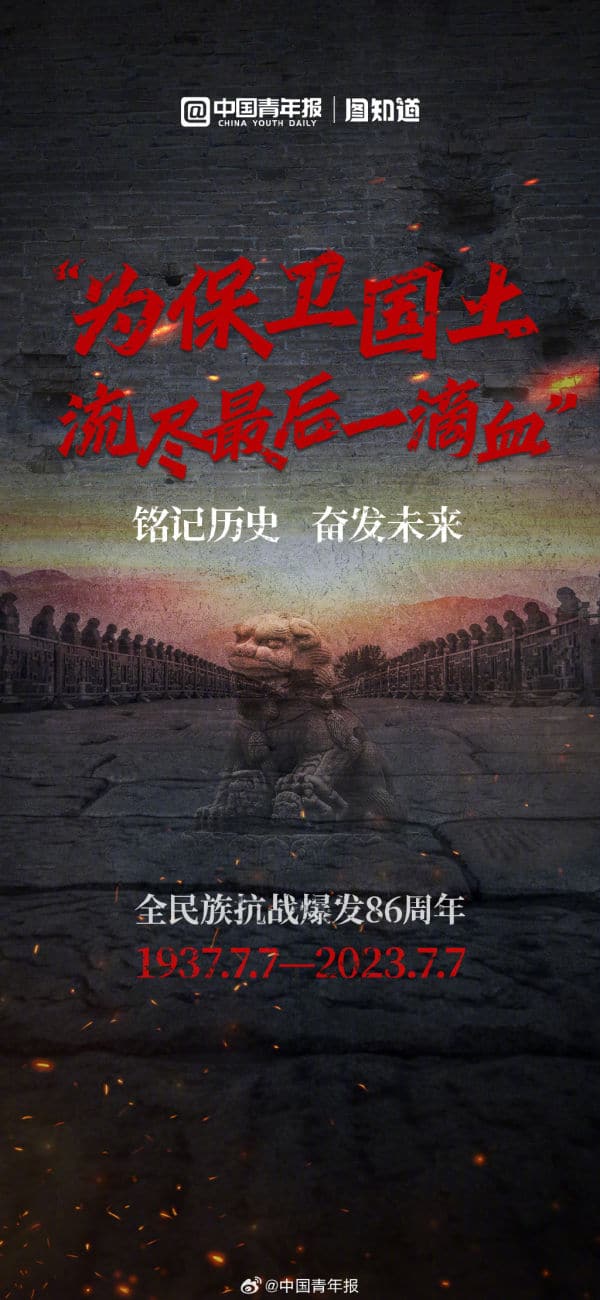
By CCTV: Both images contain the phrase “Do not forget history” (勿忘历史). The first image shows the characters for the Marco Polo Bridge Incident (“7.7. Incident” 七七事变).
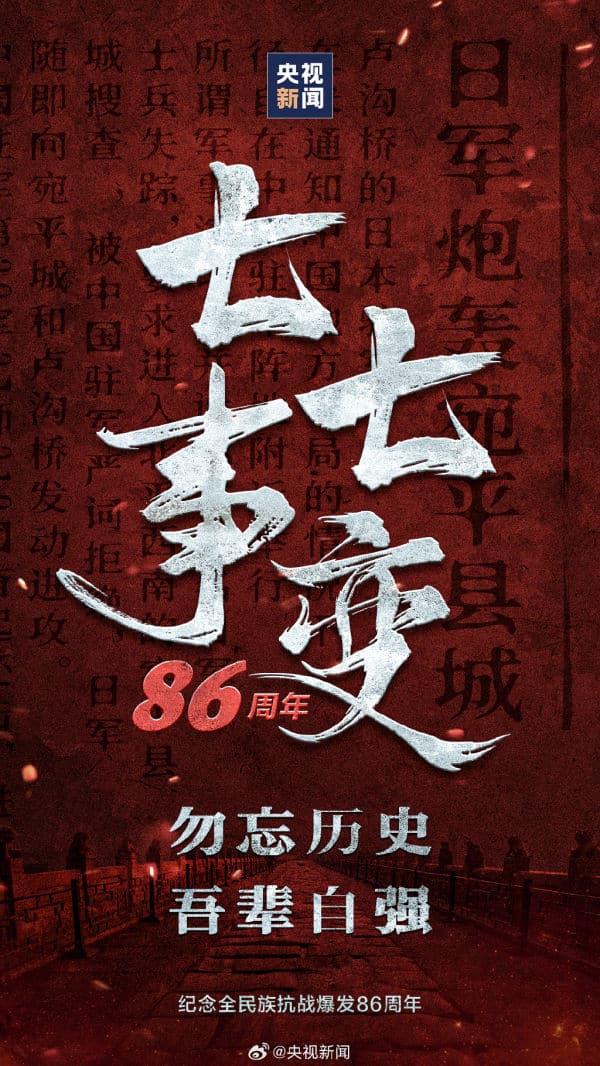
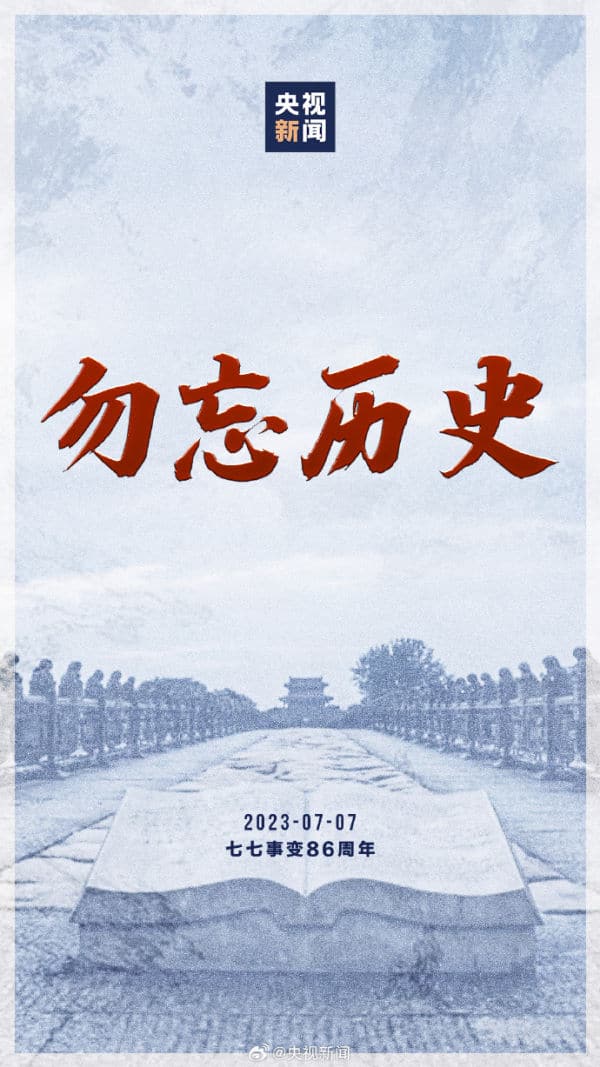
By People’s Daily: This image shows the 7.7 date, but accompanied by the text “Today, China is not the same as it was in 1937,” stressing the progress made by China in the past 83 years.
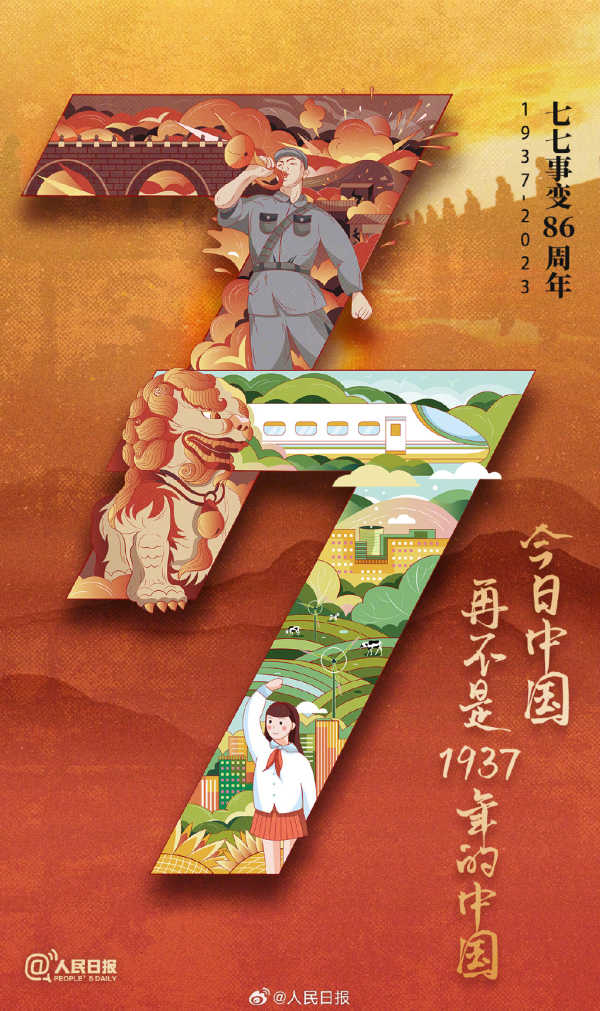
By Xinhua: Dramatized image of the Marco Polo Bridge, accompanied by the text “Never forget history, strive to be stronger” (勿忘历史, 吾辈自强).
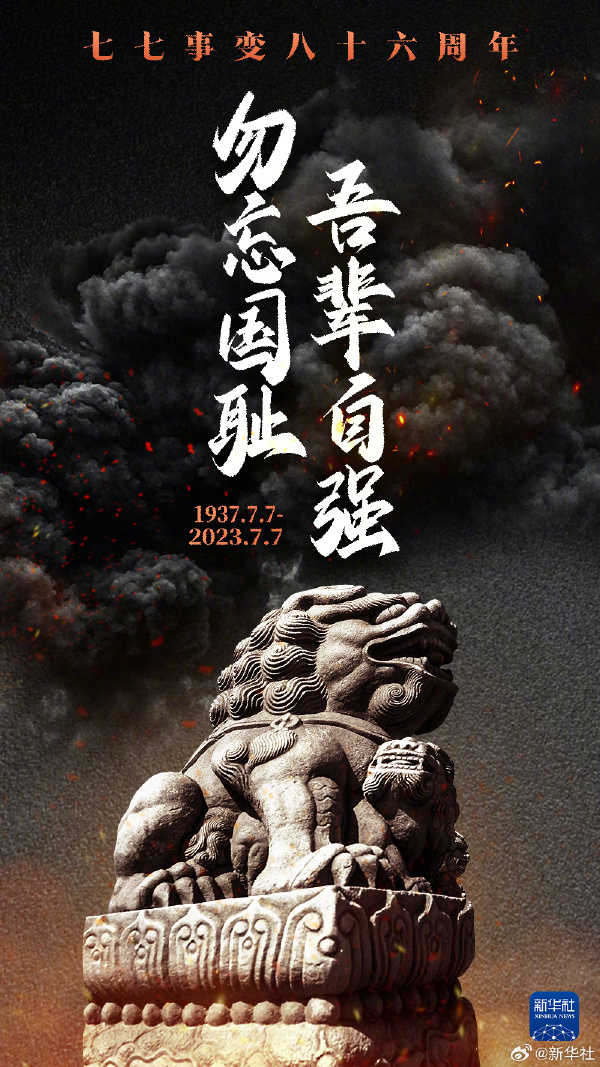
What Are Common Reactions Online?
While many commenters echo the statements and phrases that are disseminated by Chinese state media outlets on this important historical day, there are also some Chinese social media users who are using this day to vent their negative feelings towards Japan.
This was also visible in 2022, when the assassination of Japanese former premier Shinzo Abe happened. At the time, one popular comment said: “Exam candidates, remember this for extra points: July 7 is the day of the 1937 Marco Polo Bridge Incident that started China’s War of Resistance against Japan; July 8 the day when Japanese Prime Minister Shinzo Abe was shot and killed.” The comment received nearly 100,000 likes.
Some share shocking pictures depicting the ‘Rape of Nanjing,’ a gruesome episode that occurred five months after the Marco Polo Bridge Incident, and is widely recognized as one of the most horrific atrocities of the Second Sino-Japanese War. The massacre involved the mass murder of Chinese civilians by Japanese invaders during a six-week period from December 13, 1937, to January 1938.
At the Sihang Warehouse in Shanghai, people offered cigarettes and liquor to honor China's soldiers on the 86th anniversary of the Marco Polo Bridge Incident, photo on Weibo by user @合肥兔曹君. pic.twitter.com/7TTDso2L74
— Manya Koetse (@manyapan) July 7, 2023
Others also express the significance of commemorating the war and honoring those who lost their lives. One individual stated, “Even without social media, I would still remember this day. It has already been etched into the collective memory of the people.”
By Manya Koetse
Get the story behind the hashtag. Subscribe to What’s on Weibo here to receive our newsletter and get access to our latest articles:
References
Ho, Wai-Chung. 2021. Globalization, Nationalism, and Music Education in the Twenty-First Century in Greater China. Amsterdam University Press.
Lu, Suping. 2019. The 1937-1938 Nanjing Atrocities. Singapore: Springer.
Knapp, Ronald G. 2008. Chinese Bridges: Living Architecture from China’s Past. Tokyo, Rutland, Singapore: Tuttle Publishing.
Schoppa, Keith R. 2000. The Columbia Guide to Modern Chinese History. New York: Columbia University Press.
Vogel, Ezra F. 2019. China and Japan: Facing History. Cambridge: The Belknap Press of Harvard University Press.
Zhuang, Sylvie. 2023. “China to roll out patriotic education law for internet users, overseas Chinese and schoolchildren,” South China Morning Post, 26 June 2023 https://www.scmp.com/news/china/politics/article/3225435/china-roll-out-patriotic-education-law-targeting-internet-users-overseas-chinese-and-schoolchildren [7.7.23].
Spotted a mistake or want to add something? Please let us know in comments below or email us. First-time commenters, please be patient – we will have to manually approve your comment before it appears.
©2023 Whatsonweibo. All rights reserved. Do not reproduce our content without permission – you can contact us at info@whatsonweibo.com.
Manya Koetse is the founder and editor-in-chief of whatsonweibo.com. She is a writer, public speaker, and researcher (Sinologist, MPhil) on social trends, digital developments, and new media in an ever-changing China, with a focus on Chinese society, pop culture, and gender issues. She shares her love for hotpot on hotpotambassador.com. Contact at manya@whatsonweibo.com, or follow on Twitter.

Also Read
China History
A Chinese Christmas Message: It’s Not Santa Bringing Peace, but the People’s Liberation Army
On social media, Chinese official channels are not celebrating a Merry Christmas but instead focus on a Military Christmas.
Published
7 months agoon
December 26, 2023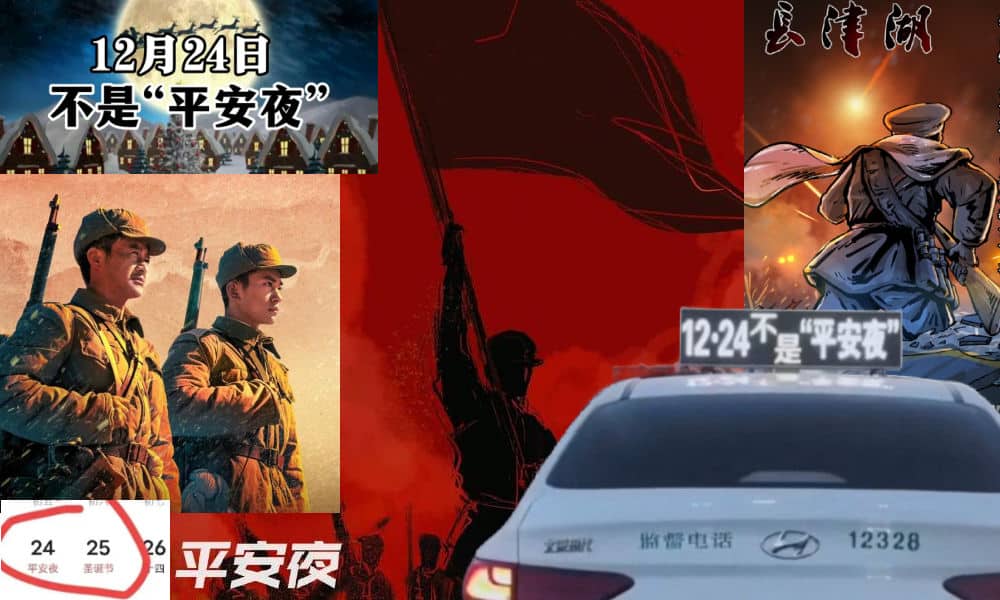
It is not Santa bringing you peace and joy, it is the People’s Liberation Army (PLA). Chinese state media and other influential social media accounts have been pushing an alternative Christmas narrative this year, which makes it very clear that this ‘Merry Christmas’ is brought by China’s military forces, not by a Western legendary figure.
On December 24, Party newspaper People’s Daily published a video on Weibo featuring various young PLA soldiers, writing:
“Thank you for your hard work! Thanks to their protection, we have a peaceful Christmas Eve. They come from all over the country, steadfastly guarding the front lines day and night. “With our youth, we defend our prosperous China!” Thank you, and salute!”
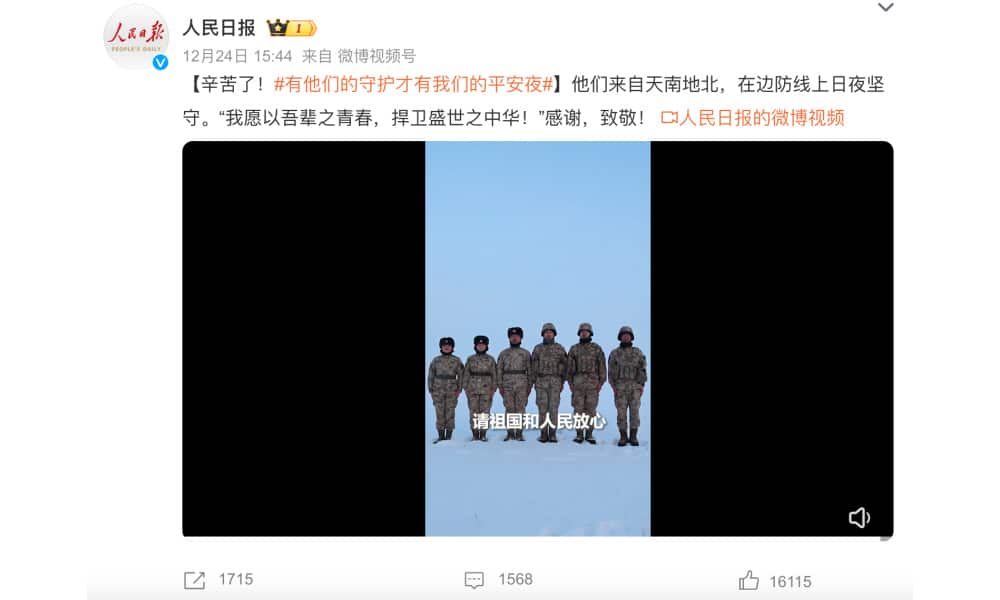
People’s Daily post on Weibo, December 24 2023.
The main argument that is propagated, is that this time in China should not be about Christmas and Santa Claus, but about remembering the end of the Korean War and paying tribute to China’s soldiers.
This narrative is not just promoted on social media by Chinese official media channels, it is also propagated in various other ways.
One Weibo user shared a photo of a mall in Binzhou where big banners were hanging reminding people of the 73rd anniversary of the Battle of Chosin Reservoir during the Korean War: “December 24 is not about Christmas Eve, but about the victory at Chosin Reservoir.”
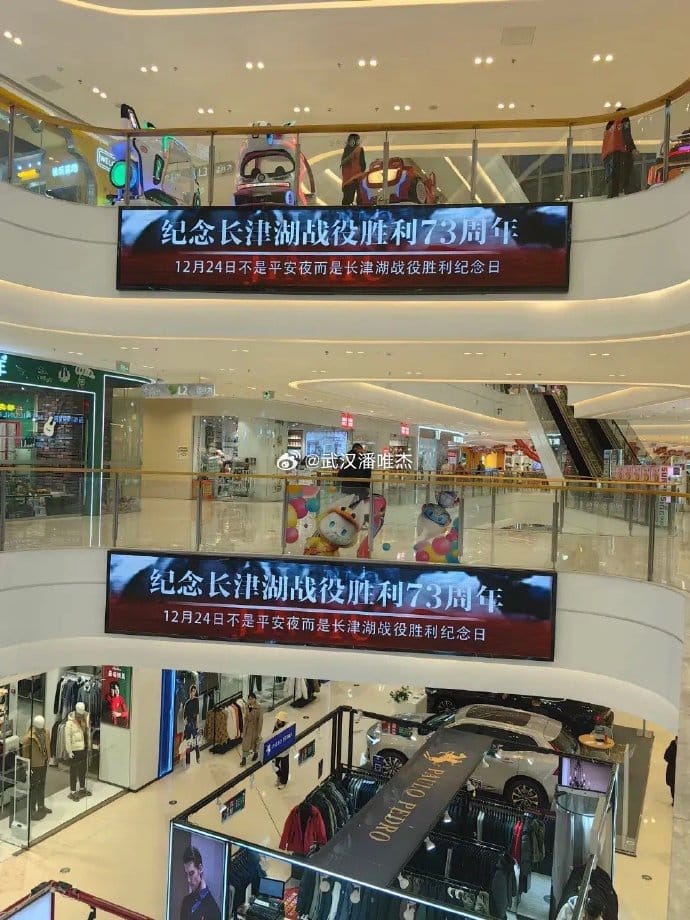
Mall banners reminding Chinese that December 24 is about commemorating the end of the Second Phase Offensive (photo taken at 滨州吾悦广场/posted by 武汉潘唯杰).
Another blogger posted a video showing LED signs on taxis, allegedly in the Hinggan League in Inner Mongolia, with the words: “December 24 is NOT Christmas Eve, it is the military victory of the Battle of Chosin Reservoir” (“12.24不是平安夜,是长津湖战役胜利日”).
Chinese taxis with a message: December 24 is NOT "Christmas Eve" but a day to commemorate the Chinese victory during the Second Phase Offensive of the Korean War in 1950. It's not a Merry Christmas but a military one. Video posted on Weibo, allegedly recorded in Inner Mongolia. pic.twitter.com/XZlRTinmXr
— Manya Koetse (@manyapan) December 26, 2023
One social media video showed a teacher at a middle school in Chongqing also emphasizing to her students that “it’s not Father Christmas who brings us a happy and peaceful life, but our young soldiers!”
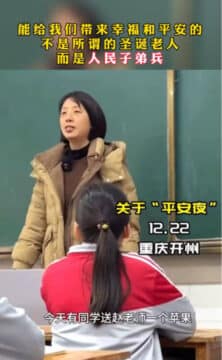
In the context of the Korean War (1950-1953), December 24 marks the conclusion of the Second Phase Offensive (1950), which was launched by the Chinese People’s Volunteer Army against the United Nations Command forces–primarily U.S. and South Korean troops.
The Chinese divisions’ surprise attack countered the ‘Home-by-Christmas’ campaign. This name stemmed from the UN forces’ belief that they would soon prevail, end the conflict, and be home well in time to celebrate Christmas. Instead, they were forced into retreat and the Chinese reclaimed most of North Korea by December 24, 1950.
The Battle of the Chosin Reservoir, also known as the the Battle at Lake Changjin, is part of this history. The battle began on November 27 of 1950, five months after the start of the Korean War. The 2021 movie Changjin Lake (长津湖/The Battle at Lake Changjin) provides a Chinese perspective on the lead-up and unfolding of this massive ground attack of the Chinese 9th Army Group, in which thousands of soldiers died.
Especially in recent years and in light of the launch of the blockbuster movie, there is an increased focus on the Chinese attack at Chosin as a glorious victory and strategic success for turning around the war situation in Korea and defending its own borders, underscoring the military strength of the People’s Republic of China as a new force to be reckoned with (read more here).
This Chinese Christmas narrative of honoring the PLA coincides with a series of popular social media posts from bloggers facing criticism for celebrating Christmas in China.
One of them is Liu Xiaoguang (刘晓光 @_恶魔奶爸_, 1.7 million followers), who wrote on December 25:
“Some people are criticizing me for celebrating Christmas Eve, because, by celebrating a foreign festival, I would be unpatriotic and forgetful of our martyrs. What can I say, in our family Christmas must be a big deal, even if I don’t come home it must be celebrated, because my mom is a Christian, and she’s very devout (..) So you see, on one hand I should promote traditional Chinese virtues, and show filial piety, on the other hand I should be patriotic and not celebrate foreign festivals.”
Meanwhile, other popular bloggers stress the importance of remembering China’s military heroes during this time. Influential media blogger Zhang Xiaolei (@晓磊) posted: “It’s not Santa Claus who gives you peace, it’s the Chinese soldiers! #ChristmasEve” (“给你平安的不是圣诞老人,而是中国军人!🙏#平安夜#”). With his post, he added various pictures showing Chinese soldiers frozen in the snow as also depicted in the Battle at Lake Changjin movie.

Throughout the years, Christmas has become more popular in China, but as a predominantly atheist country with a small proportion of Christians, the festival is more about the commercial side of the holiday season including shopping and promotions, decorations, entertainment, etc.
Nevertheless, Christmas in China is generally perceived as “a foreign” or “Western” festival, and there have been consistent concerns that the festivities associated with Christmas clash with traditional Chinese culture.
In the past, these concerns have led to actual bans on Christmas celebrations. For instance, in 2017, officials in Hengyang were instructed not to partake in Christmas festivities and several universities throughout China have previously cautioned students against engaging in Christmas-related activities.
Chinese political and social commentator Hu Xijin (@胡锡进) also weighed in on the issue. In his December 24 social media column, the former Global Times editor-in-chief wrote that there is no problem with Christmas Eve and the Second Phase Offensive victory day both receiving attention on the same day. Even if the younger generations in China view Christmas more as a commercial event rather than a religious one, it’s understandable for businesses to capitalize on this period for additional revenue. He wrote:
“In this era of globalization, holiday cultures inevitably influence each other. The Chinese government does not actively promote the rise of “Western holidays” for its own reasons, but they also have no intention to “suppress foreign holidays.” Some Chinese celebrate “Western holidays” and it is their right to do, they should not face criticism for it.”
Although many Chinese netizens post different viewpoints on this year’s Christmas debate, there are some who just don’t understand what all the fuss is about. “December 24 can be both Christmas Eve, and it can be Victory Day. It’s not like we need to pick one over the other. We are free to choose whatever.”
By Manya Koetse
Get the story behind the hashtag. Subscribe to What’s on Weibo here to receive our newsletter and get access to our latest articles:
Spotted a mistake or want to add something? Please let us know in comments below or email us. First-time commenters, please be patient – we will have to manually approve your comment before it appears.
©2023 Whatsonweibo. All rights reserved. Do not reproduce our content without permission – you can contact us at info@whatsonweibo.com.
Backgrounder
“Oppenheimer” in China: Highlighting the Story of Qian Xuesen
Qian Xuesen is a renowned Chinese scientist whose life shares remarkable parallels with Oppenheimer’s.
Published
10 months agoon
September 16, 2023By
Zilan Qian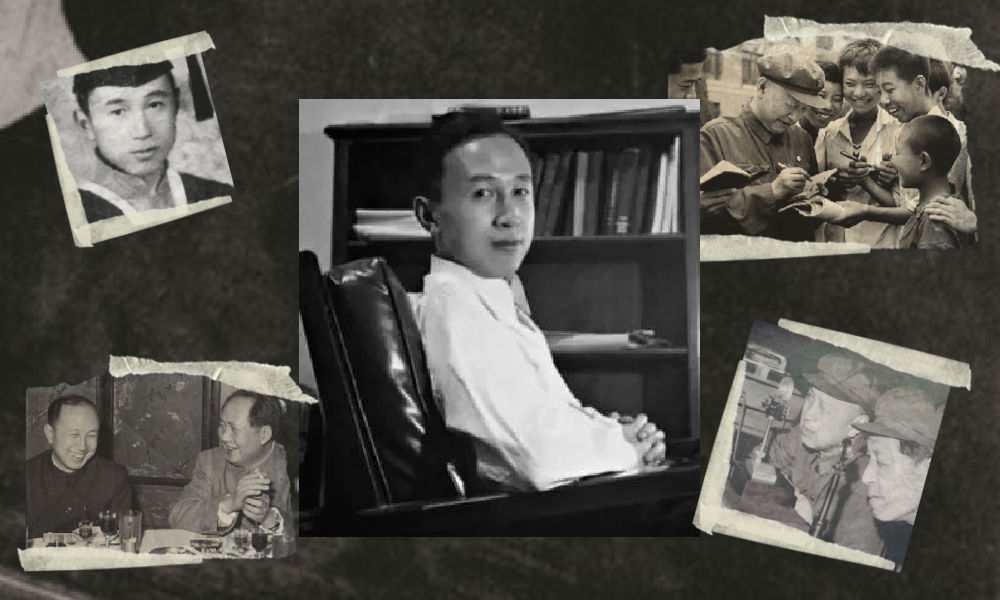
They shared the same campus, lived in the same era, and both played pivotal roles in shaping modern history while navigating the intricate interplay between science and politics. With the release of the “Oppenheimer” movie in China, the renowned Chinese scientist Qian Xuesen is being compared to the American J. Robert Oppenheimer.
In late August, the highly anticipated U.S. movie Oppenheimer finally premiered in China, shedding light on the life of the famous American theoretical physicist J. Robert Oppenheimer (1904-1967).
Besides igniting discussions about the life of this prominent scientist, the film has also reignited domestic media and public interest in Chinese scientists connected to Oppenheimer and nuclear physics.
There is one Chinese scientist whose life shares remarkable parallels with Oppenheimer’s. This is aerospace engineer and cyberneticist Qian Xuesen (钱学森, 1911-2009). Like Oppenheimer, he pursued his postgraduate studies overseas, taught at Caltech, and played a pivotal role during World War II for the US.
Qian Xuesen is so widely recognized in China that whenever I introduce myself there, I often clarify my last name by saying, “it’s the same Qian as Qian Xuesen’s,” to ensure that people get my name.
Some Chinese blogs recently compared the academic paths and scholarly contributions of the two scientists, while others highlighted the similarities in their political challenges, including the revocation of their security clearances.
The era of McCarthyism in the United States cast a shadow over Qian’s career, and, similar to Oppenheimer, he was branded as a “communist suspect.” Eventually, these political pressures forced him to return to China.
Although Qian’s return to China made his later life different from Oppenheimer’s, both scientists lived their lives navigating the complex dynamics between science and politics. Here, we provide a brief overview of the life and accomplishments of Qian Xuesen.
Departing: Going to America
Qian Xuesen (钱学森, also written as Hsue-Shen Tsien), often referred to as the “father of China’s missile and space program,” was born in Shanghai in 1911,1 a pivotal year marked by a historic revolution that brought an end to the imperial dynasty and gave rise to the Republic of China.
Much like Oppenheimer, who pursued further studies at Cambridge after completing his undergraduate education, Qian embarked on a journey to the United States following his bachelor’s studies at National Chiao Tung University (now Shanghai Jiao Tong University). He spent a year at Tsinghua University in preparation for his departure.
The year was 1935, during the eighth year of the Chinese Civil War and the fourth year of Japan’s invasion of China, setting the backdrop for his academic pursuits in a turbulent era.
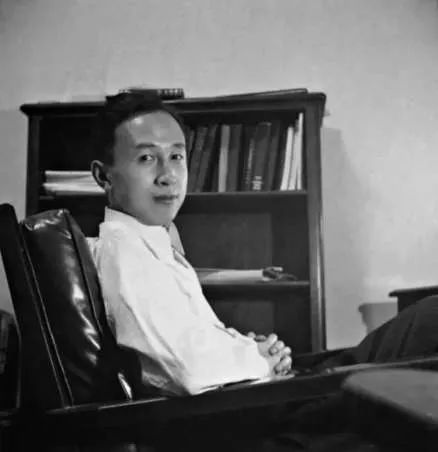
Qian in his office at Caltech (image source).
One year after arriving in the U.S., Qian earned his master’s degree in aeronautical engineering from the Massachusetts Institute of Technology (MIT). Three years later, in 1939, the 27-year-old Qian Xuesen completed his PhD at the California Institute of Technology (Caltech), the very institution where Oppenheimer had been welcomed in 1927. In 1943, Qian solidified his position in academia as an associate professor at Caltech. While at Caltech, Qian helped found NASA’s Jet Propulsion Laboratory.
When World War II began, while Oppenheimer was overseeing the Manhattan Project’s efforts to assist the U.S. in developing the atomic bomb, Qian actively supported the U.S. government. He served on the U.S. government’s Scientific Advisory Board and attained the rank of lieutenant colonel.

The first meeting of the US Department of the Air Force Scientific Advisory Board in 1946. The predecessor, the Scientific Advisory Group, was founded in 1944 to evaluate the aeronautical programs and facilities of the Axis powers of World War II. Qian can be seen standing in the back, the second on the left (image source).
After the war, Qian went to teach at MIT and returned to Caltech as a full-time professor in 1949. During that same year, Mao Zedong proclaimed the establishment of the People’s Republic of China (PRC). Just one year later, the newly-formed nation became involved in the Korean War, and China fought a bloody battle against the United States.
Red Scare: Being Labeled as a Communist
Robert Oppenheimer and Qian Xuesen both had an interest in Communism even prior to World War II, attending communist gatherings and showing sympathy towards the Communist cause.
Qian and Oppenheimer may have briefly met each other through their shared involvement in communist activities. During his time at Caltech, Qian secretly attended meetings with Frank Oppenheimer, the brother of J. Robert Oppenheimer (Monk 2013).
However, it was only after the war that their political leanings became a focal point for the FBI.
Just as the FBI accused Oppenheimer of being an agent of the Soviet Union, they quickly labeled Qian as a subversive communist, largely due to his Chinese heritage. While the government did not succeed in proving that Qian had communist ties with China during that period, they did ultimately succeed in portraying Qian as a communist affiliated with China a decade later.
During the transition from the 1940s to the 1950s, the Cold War was underway, and the anti-communist witch-hunts associated with the McCarthy era started to intensify (BBC 2020).
In 1950, the Korean War erupted, with the People’s Republic of China (PRC) joining North Korea in the conflict against South Korea, which received support from the United States. It was during this tumultuous period that the FBI officially accused Qian of communist sympathies in 1950, leading to the revocation of his security clearance despite objections from Qian’s colleagues. Four years later, in 1954, Robert Oppenheimer went through a similar process.
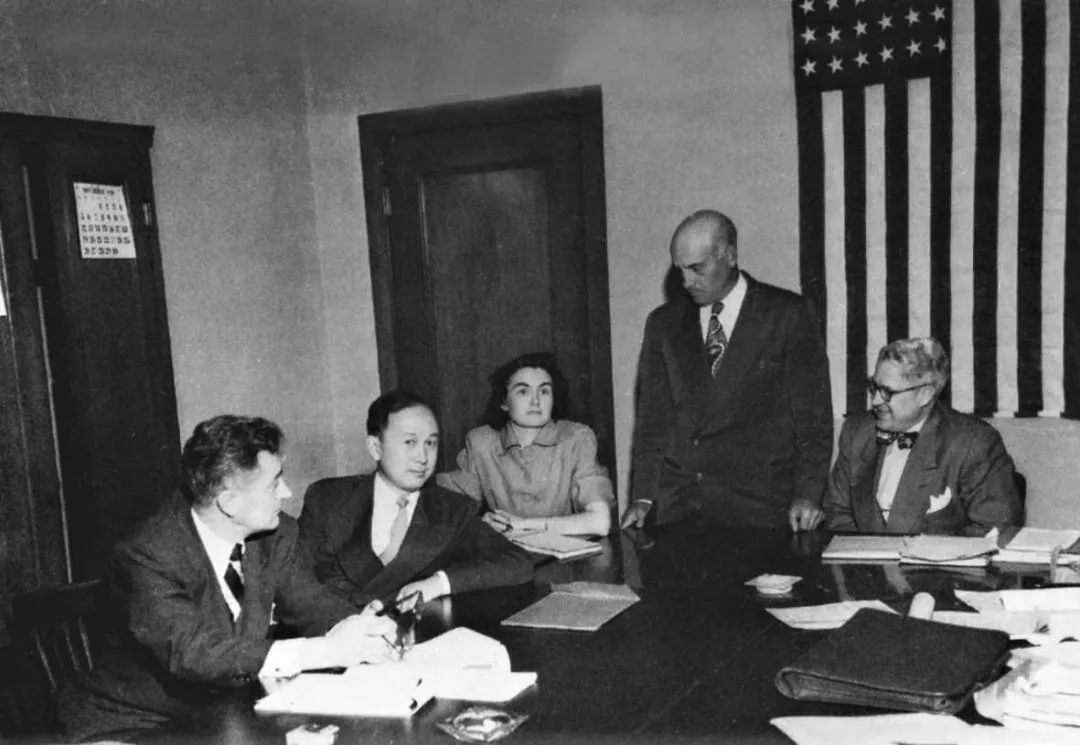
The 1950’s security hearing of Qian (second left). (Image source).
After losing his security clearance, Qian began to pack up, saying he wanted to visit his aging parents back home. Federal agents seized his luggage, which they claimed contained classified materials, and arrested him on suspicion of subversive activity. Although Qian denied any Communist leanings and rejected the accusation, he was detained by the government in California and spent the next five years under house arrest.
Five years later, in 1955, two years after the end of the Korean War, Qian was sent home to China as part of an apparent exchange for 11 American airmen who had been captured during the war. He told waiting reporters he “would never step foot in America again,” and he kept his promise (BBC 2020).
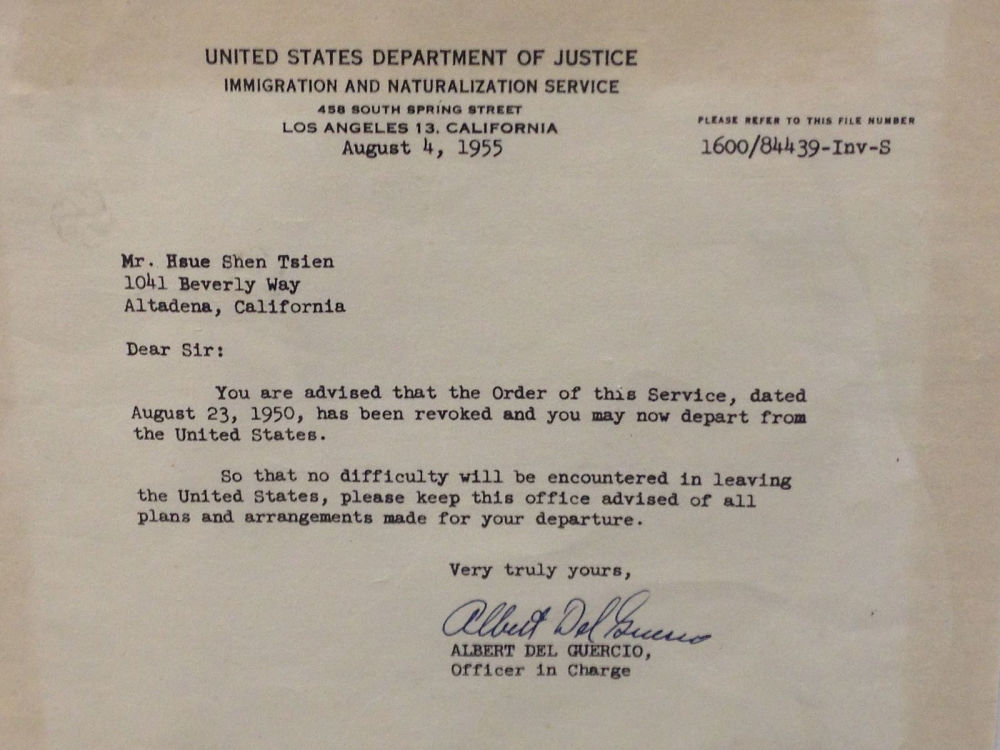
A letter from the US Immigration and Naturalization Service to Qian Xuesen, dated August 4, 1955, in which he was notified he was allowed to leave the US. The original copy is owned by Qian Xuesen Library of Shanghai Jiao Tong University, where the photo was taken. (Caption and image via wiki).
Dan Kimball, who was the Secretary of the US Navy at the time, expressed his regret about Qian’s departure, reportedly stating, “I’d rather shoot him dead than let him leave America. Wherever he goes, he equals five divisions.” He also stated: “It was the stupidest thing this country ever did. He was no more a communist than I was, and we forced him to go” (Perrett & Bradley, 2008).
Kimball may have foreseen the unfolding events accurately. After his return to China, Qian did indeed assume a pivotal role in enhancing China’s military capabilities, possibly surpassing the potency of five divisions. The missile programme that Qian helped develop in China resulted in weapons which were then fired back on America, including during the 1991 Gulf War (BBC 2020).
Returning: Becoming a National Hero
The China that Qian Xuesen had left behind was an entirely different China than the one he returned to. China, although having relatively few experts in the field, was embracing new possibilities and technologies related to rocketry and space exploration.
Within less than a month of his arrival, Qian was welcomed by the then Vice Prime Minister Chen Yi, and just four months later, he had the honor of meeting Chairman Mao himself.
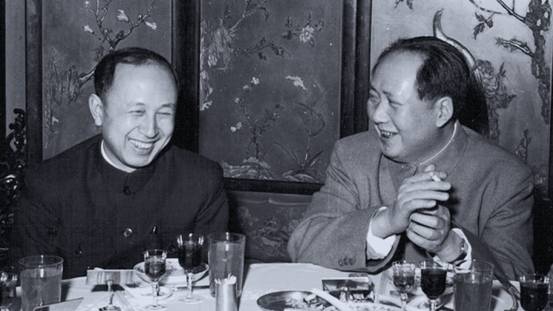
Qian and Mao (image source).
In China, Qian began a remarkably successful career in rocket science, with great support from the state. He not only assumed leadership but also earned the distinguished title of the “father” of the Chinese missile program, instrumental in equipping China with Dongfeng ballistic missiles, Silkworm anti-ship missiles, and Long March space rockets.
Additionally, his efforts laid the foundation for China’s contemporary surveillance system.
By now, Qian has become somewhat of a folk hero. His tale of returning to China despite being thwarted by the U.S. government has become like a legendary narrative in China: driven by unwavering patriotism, he willingly abandoned his overseas success, surmounted formidable challenges, and dedicated himself to his motherland.
Throughout his lifetime, Qian received numerous state medals in recognition of his work, establishing him as a nationally celebrated intellectual. From 1989 to 2001, the state-launched public movement “Learn from Qian Xuesen” was promoted throughout the country, and by 2001, when Qian turned 90, the national praise for him was on a similar level as that for Deng Xiaoping in the decade prior (Wang 2011).
Qian Xuesen remains a celebrated figure. On September 3rd of this year, a new “Qian Xuesen School” was established in Wenzhou, Zhejiang Province, becoming the sixth high school bearing the scientist’s name since the founding of the first one only a year ago.
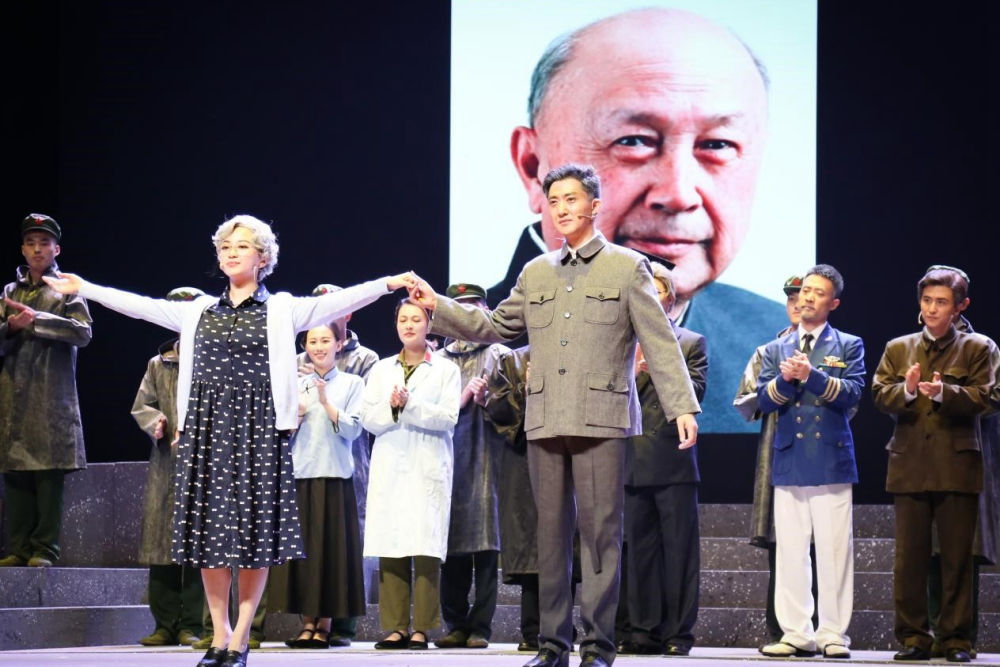
In 2017, the play “Qian Xuesen” was performed at Qian’s alma mater, Shanghai Jiaotong University. (Image source.)
Qian Xuesen’s legacy extends well beyond educational institutions. His name frequently appears in the media, including online articles, books, and other publications. There is the Qian Xuesen Library and a museum in Shanghai, containing over 70,000 artefacts related to him. Qian’s life story has also been the inspiration for a theater production and a 2012 movie titled Hsue-Shen Tsien (钱学森).2
Unanswered Questions
As is often the case when people are turned into heroes, some part of the stories are left behind while others are highlighted. This holds true for both Robert Oppenheimer and Qian Xuesen.
The Communist Party of China hailed Qian as a folk hero, aligning with their vision of a strong, patriotic nation. Many Chinese narratives avoid the debate over whether Qian’s return was linked to problems and accusations in the U.S., rather than genuine loyalty to his homeland.
In contrast, some international media have depicted Qian as a “political opportunist” who returned to China due to disillusionment with the U.S., also highlighting his criticism of “revisionist” colleagues during the Cultural Revolution and his denunciation of the 1989 student demonstrations.
Unlike the image of a resolute loyalist favored by the Chinese public, Qian’s political ideology was, in fact, not consistently aligned, and there were instances where he may have prioritized opportunity over loyalty at different stages of his life.
Qian also did not necessarily aspire to be a “flawless hero.” Upon returning to China, he declined all offers to have his biography written for him and refrained from sharing personal information with the media. Consequently, very little is known about his personal life, leaving many questions about the motivations driving him, and his true political inclinations.

The marriage photo of Qian and Jiang. (Image source).
We do know that Qian’s wife, Jiang Ying (蒋英), had a remarkable background. She was of Chinese-Japanese mixed race and was the daughter of a prominent military strategist associated with Chiang Kai-shek. Jiang Ying was also an accomplished opera singer and later became a professor of music and opera at the Central Conservatory of Music in Beijing.
Just as with Qian, there remain numerous unanswered questions surrounding Oppenheimer, including the extent of his communist sympathies and whether these sympathies indirectly assisted the Soviet Union during the Cold War.
Perhaps both scientists never imagined they would face these questions when they first decided to study physics. After all, they were scientists, not the heroes that some narratives portray them to be.
Also read:
■ Farewell to a Self-Taught Master: Remembering China’s Colorful, Bold, and Iconic Artist Huang Yongyu
■ “His Name Was Mao Anying”: Renewed Remembrance of Mao Zedong’s Son on Chinese Social Media
By Zilan Qian
Follow @whatsonweibo
1 Some sources claim that Qian was born in Hangzhou, while others say he was born in Shanghai with ancestral roots in Hangzhou.
2The Chinese character 钱 is typically romanized as “Qian” in Pinyin. However, “Tsien” is a romanization in Wu Chinese, which corresponds to the dialect spoken in the region where Qian Xuesen and his family have ancestral roots.
This article has been edited for clarity by Manya Koetse
References (other sources hyperlinked in text)
BBC. 2020. “Qian Xuesen: The man the US deported – who then helped China into space.” BBC.com, 27 October https://www.bbc.com/news/stories-54695598 [9.16.23].
Monk, Ray. 2013. Robert Oppenheimer: A Life inside the Center, First American Edition. New York: Doubleday.
Perrett, Bradley, and James R. Asker. 2008. “Person of the Year: Qian Xuesen.” Aviation Week and Space Technology 168 (1): 57-61.
Wang, Ning. 2011. “The Making of an Intellectual Hero: Chinese Narratives of Qian Xuesen.” The China Quarterly, 206, 352-371. doi:10.1017/S0305741011000300
Get the story behind the hashtag. Subscribe to What’s on Weibo here to receive our newsletter and get access to our latest articles:
Spotted a mistake or want to add something? Please let us know in comments below or email us. First-time commenters, please be patient – we will have to manually approve your comment before it appears.
©2023 Whatsonweibo. All rights reserved. Do not reproduce our content without permission – you can contact us at info@whatsonweibo.com.
Subscribe

Weibo Watch: The Future is Here

“Bye Bye Biden”: Biden’s Many Nicknames in Chinese

Enjoying the ‘Sea’ in Beijing’s Ditan Park

A Triumph for “Comrade Trump”: Chinese Social Media Reactions to Trump Rally Shooting

Weibo Watch: Get Up, Stand Up

The Tragic Story of “Fat Cat”: How a Chinese Gamer’s Suicide Went Viral

“Old Bull Eating Young Grass”: 86-Year-Old Chinese Painter Fan Zeng Marries 36-Year-Old Xu Meng

A Brew of Controversy: Lu Xun and LELECHA’s ‘Smoky’ Oolong Tea

Singing Competition or Patriotic Fight? Hunan TV’s ‘Singer 2024’ Stirs Nationalistic Sentiments

Zara Dress Goes Viral in China for Resemblance to Haidilao Apron

Weibo Watch: The Battle for the Bottom Bed

About the “AI Chatbot Based on Xi Jinping” Story

China’s Intensified Social Media Propaganda: “Taiwan Must Return to Motherland”

Weibo Watch: Telling China’s Stories Wrong

Saying Goodbye to “Uncle Wang”: Wang Wenbin Becomes Chinese Ambassador to Cambodia
Get in touch
Would you like to become a contributor, or do you have any tips or suggestions? Get in touch here!
Popular Reads
-

 China Insight3 months ago
China Insight3 months agoThe Tragic Story of “Fat Cat”: How a Chinese Gamer’s Suicide Went Viral
-

 China Music4 months ago
China Music4 months agoThe Chinese Viral TikTok Song Explained (No, It’s Not About Samsung)
-

 China Digital10 months ago
China Digital10 months agoToo Sexy for Weibo? Online Discussions on the Concept of ‘Cābiān’
-

 China Arts & Entertainment12 months ago
China Arts & Entertainment12 months agoBehind 8 Billion Streams: Who is Dao Lang Cursing in the Chinese Hit Song ‘Luocha Kingdom’?




